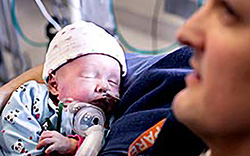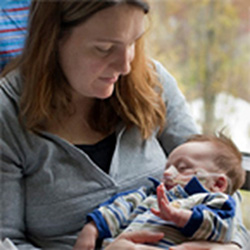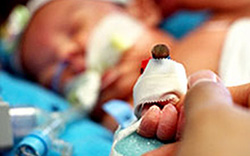What to Expect in the NICU

Having a very sick or premature baby can feel overwhelming. We are with you at every step, supporting your family while we give your baby the highest level of care in our Level IV Neonatal Intensive Care Init (NICU). This includes state-of-the-art breathing support and bedside surgery if needed.
As parents, you are the most important members of our healthcare team. A expert in newborn care () will lead your baby’s team of neonatal care providers and specialists in nutrition, pharmacy, , physical and occupational therapy and nursing.
Experts in other will treat your baby, depending on their condition and needs. These may include specialists in pediatric surgery, genetics, the heart (cardiology), nervous system (neurosciences), lungs and airways (pulmonary), ears-nose-throat (otolaryngology), digestive tract (gastroenterology), liver (hepatology) and conditions affecting the face and head (craniofacial). Together, we will plan and provide the very best, personalized care for your baby.
Family-Centered Care

We practice family-centered care. This means we partner with you to talk about and make treatment plans for your baby. Your nurse can help you find ways to touch, hold and bond — even if your baby is on a ventilator for breathing support. We will help you learn about caring for your baby so that you are comfortable and confident.
We encourage you to be with your baby in the NICU as much as possible. You are welcome to assist with caregiving, take part in daily care team meetings (called morning rounds), ask questions and share your concerns.
A member of your baby’s care team is on the unit 24 hours a day to answer any questions you may have. Learn more in our guide to the NICU.
You can choose up to 4 adults (known as caregivers) to be with your child. Two caregivers can be in the hospital at a time and can switch out as needed. The NICU is open to parents and caregivers 24 hours a day. Ask your nurse about visiting hours for siblings, friends and other family members.
A Healing Place to Bond With Baby
In addition to specialized neonatal care, our Level IV NICU is designed as a safe, healing place for newborns and their families. All rooms are private. To support breastfeeding/chestfeeding, every room has a breast pump and specialized milk warmer.
Each room also has:
- A recliner for holding your baby
- Pull-out sofa bed for overnight stays (for 2 parents or caregivers)
- Bathroom with shower
- Free Wi-Fi for high-speed Internet connection
- Touchscreen TV
- Refrigerator
Each wing has a quiet space for self-care without leaving the NICU. Room service is also available.
Rooms have space and equipment to provide bedside surgery if your baby is too fragile to be moved. The NICU is near key departments such as the cardiac intensive care unit (CICU), pediatric intensive care unit (PICU) and the emergency department.
Daily Schedule
This schedule may vary somewhat based on your baby’s needs. Every 3 to 6 hours we check their vital signs (temperature, blood pressure, heart rate). For details on healthcare team members and roles, see our guide to the NICU (PDF).
| 6:30 to 8 a.m. | If your child is being seen by the Surgery service, the surgeons and NICU doctors will be stopping by to check on surgical site healing and discuss plans for the next 24 hours. |
| 7 to 7:30 a.m. | The off-going and on-coming nurses will meet to hand off care by discussing all important aspects of your baby’s care. |
| 7:30 to 9 a.m. | You are welcome to help the nurse with caregiving tasks we’ve shown you how to do. |
| 8:30 a.m. to noon | Each day, you and the care team will “round,” or discuss your child’s current status, test results and treatment goals, and make changes to the plan of care. Let your baby’s nurse know if you would like to be called during daily rounds for your baby. Your nurse will go over what to expect throughout the day. Activities can include dressing changes, X-rays or testing, occupational/physical therapy visits, working with lactation services and spending time with your child. |
| Late afternoon | The nurse will change your baby’s IV fluids and tubings. |
| 7 to 7:30 p.m. | RN shift change and handoff occur, and the night nurse will repeat the care process as described above. |
| 9:30 to 11:30 p.m. | Night rounds occur. This is a shorter version of morning rounds and includes the medical providers, bedside nurse, and parents if you are present. Overnight nursing care is similar to daytime and includes a focus on creating a nighttime routine and environment. The room will be darker and quieter. Activities will include weighing your baby, giving a bath or light cleansing and changing their bed linens. |
| 3 to 6 a.m. | Lab blood draws and X-rays will be completed. The care team will use this information to make decisions about your baby’s plan of care. |
Wrap-Around Services
 To help parents and caregivers handle the stress of having a tiny or sick baby, we offer many services, from massages and haircuts to and social work support. At any point, if you have questions or don’t understand something, please ask your child’s nurse, doctor or anyone on your healthcare team.
To help parents and caregivers handle the stress of having a tiny or sick baby, we offer many services, from massages and haircuts to and social work support. At any point, if you have questions or don’t understand something, please ask your child’s nurse, doctor or anyone on your healthcare team.
- Welcome to the Neonatal Intensive Care Unit (NICU), a basic guide to a stay in the NICU
- Lactation Services for breastfeeding/ support, including the Lactation Meal Program
- Postpartum Care: Healing After the Birth of Your Baby (PDF)
- Social Work to promote wellness and help find resources for family needs like food, housing and transportation
- Patient and Family Resources to help you learn about your baby’s condition, treatments and hospital services
- Spiritual Care for pastoral and emotional support to families from diverse faiths and cultures
- Family Resource Center with showers, laundry, kitchen, phone chargers, Wi-Fi, computer access and family quiet room
- Guest Services for help with transportation or finding lodging for your family while your baby is in the NICU
- Neonatal transport team to safely bring fragile newborns to Seattle Children’s
What happens after NICU care?
When your baby is ready to leave the NICU, your nurses and doctors will work with the new care team on a smooth, safe transition. Your baby may move to another care team at Seattle Children’s or to a hospital near your home. If you have any questions about leaving the NICU, talk with your nurse.
If you live outside the Seattle area, we can help you and your baby move closer to home.
Many babies born too early or with complex conditions will need care throughout childhood. To support your child’s long-term health and quality of life, we offer specialized programs such as:
- Developmental Follow-Up After a NICU Stay (PDF)
- Neurodevelopmental Program
- Bronchopulmonary Dysplasia Program
- Congenital Diaphragmatic Hernia Program
Your Baby’s Transport to the NICU
Our neonatal transport team of doctors, nurses and respiratory therapists are national leaders in safely moving fragile newborns. To closely monitor your baby and provide treatment along the way, we use ambulances and aircraft that are fully equipped with neonatal- and pediatric-sized medical equipment.
